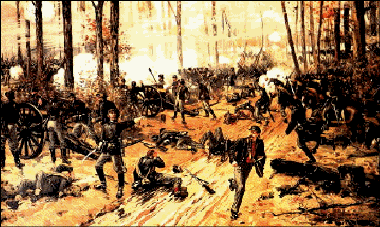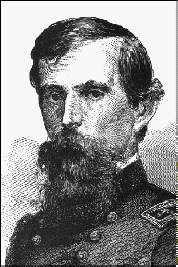|
Shiloh
The Battle of Shiloh (also known as
Pittsburgh Landing) took place in the hills of Tennessee along the Tennessee River on
April 6 and 7, 1862. General Grant and his 42,000 man army had camped there. Confederate
General Albert Sidney Johnston moved toward Grant over the objections of his staff, who
were concerned Grant would soon get reinforcements. Johnston stated, "I would
fight him if he were a million."
The rebels, on the march and without food for 24 hours, caught Grant's army by surprise. Eight of ten Union soldiers at Shiloh had
never been in a battle, and pandemonium was the reaction. One sergeant recalled a soldier
running from the front shouting, "Give them hell, boys, I gave them hell as long
as I could!" For the first time, many federal soldiers heard the 'rebel yell' and
witnessed the courage of the gray-clad fighters. A Union veteran recalled them coming like
'maddened demons.' Another said that it "seemed almost barbarous to fire on brave
men pressing forward so heroically to the mouth of hell." Portions of the
battlefield known as the 'sunken road' the 'hornet's nest,' and the 'peach orchard' were
scenes of vicious fighting.
The 20th Ohio was pressed into service as part
of General Lewis Wallace's division. Dwight later recalled: "The ear was oppressed
with the agony of sound. Thousands of muskets poured forth a constant roar of fierce
wrath. Hundreds of cannon thundered defiance and death. Fragments of words of command were
drowned by the clank and clatter of new batteries hurrying into position to the clarion
call of the bugle. It was a swift swirling tempest of mad action, beyond imagination and
indescribable." forth a constant roar of fierce
wrath. Hundreds of cannon thundered defiance and death. Fragments of words of command were
drowned by the clank and clatter of new batteries hurrying into position to the clarion
call of the bugle. It was a swift swirling tempest of mad action, beyond imagination and
indescribable."
After the first day's battle, the men of the
20th lay on the bare ground, listening to the cries of the wounded in front of them. None
dared to help those men in distress, as each movement brought a volley of fire from the
enemy. One Union soldier later remembered: "I could hear those poor fellows crying
for water...God heard them, for the heavens opened up and the rains came." Dwight
and his men then slept in the mud. Throughout the night, federal gunboats shelled the
enemy camps. Misery prevailed on both sides. That night, General Sherman said to Grant,
"Well, General Grant, we've had the devil's own day, haven't we?"
The next day, General
Buell arrived with the Army of the Ohio and 25,000 fresh troops. After another day of
fighting, the Confederates fell back. The battle could hardly be called a victory for
either side. Shelby County resident William Dalton published his recollections of the
battle's aftermath in the "Shelby County Democrat" on March 1, 1907. His
sister's husband, Miller Berry of Piqua, was killed. Dalton saw "dead men lying in
all conceivable shapes all along the line. Several of our regiment had been killed in
their beds the night before. Dead Johnnies lay all around our camp."
All of the major Shelby County regiments saw action at
Shiloh. Thirty-five local men were killed, wounded or captured there. Shelby County
resident and 20th Ohio soldier Harlan Hall, who left his job as a school teacher to fight,
was one of the men killed.
To Lt. Dwight, the battle offered one
consolation. The men of the 20th found enough new Confederate Enfield rifles (made
in England for the rebels) to replace their own weapons.
One hundred thousand men had fought at
Shiloh. Nearly one in four was a casualty. Afterwards, Grant tried to put
things in perspective. "Up to the Battle of Shiloh, I, as well as thousands of
other citizens, believed that the rebellion against the government would collapse suddenly
and soon if a decisive victory could be gained over any of its armies...but (afterward) I
gave up all idea of saving the union except by complete conquest."

General Lewis Wallace
'Civil War'
segment written in July, 1998 by Rich Wallace
[ Back to Civil War Index ]
|

